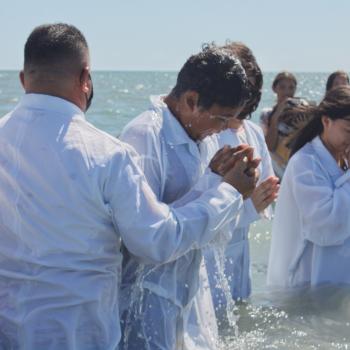I believe that the notion that “we’re all just sinners saved by grace” is largely a result of poor translations of Paul’s statement in 1 Timothy 1. According to some interpretations of this passage, Paul claims to be the lowest of sinners. But, was Paul really the worst sinner? And if so, are we all just sinners saved by grace?
The New International Version reads:
Here is a trustworthy saying that deserves full acceptance: Christ Jesus came into the world to save sinners—of whom I am the worst (1 Tim. 1:15).
Paul was known for his loyalty and obedience to God. Would he really describe himself as the worst sinner? And if so, the worst compared to who? Certainly not everyone. Also, why do the contents of his letters seem to convey a different message?
Let’s journey together through Scripture to see if we can figure out something that makes sense. Our first stop will be 1 Timothy 1:15-16, before we move on to look at verses that relate to sinners.
Let’s begin.
Paul. The Worst Sinner?
Paul said that Jesus Christ came into the world to save sinners of whom he was protos (πρωτος). The Greek word protos can mean “destined,” “chief,” “before,” “in front,” or “first.” It’s where we get the word prototype.
Additionally, the word protos can convey the sense of being superior to, above, or first in rank. Therefore, the word “chief” would be the best translation of protos in this verse since it can refer to one who is “principal,” “first,” or “placed above the rest.” To add, the word chief comes from a Latin word that means “leader,” “head,” or “guide.”
Therefore, what the apostle was saying was exactly what he said. He was a chief, leader, or guide to sinners, whom Christ came to save. Nothing else makes sense or fits with Scripture.
Now, let’s confirm this with other biblical passages.
Acts 13:47 NIV reads:
For this is what the Lord has commanded us: “‘I have made you a light for the Gentiles,
that you may bring salvation to the ends of the earth.
The Lord made Barnabas and Paul into lights. When searching for Jesus, the wise men followed the light of the star until it led them to Christ. In Scripture, the Word is called a “lamp unto my feet.” Additionally, a lighthouse is used for warning and guiding ships at sea.
Light leads the way, and points people in the right direction. It makes what is hidden by the darkness, visible.
Paul served as a light, or guide for sinners, leading them down the path to salvation and serving as an example of God’s grace and mercy to all who would believe (1 Tim. 15:16).
Acts 26:15-18 NIV states:
“Then I asked, ‘Who are you, Lord?’
“ ‘I am Jesus, whom you are persecuting,’ the Lord replied. 16 ‘Now get up and stand on your feet. I have appeared to you to appoint you as a servant and as a witness of what you have seen and will see of me. 17 I will rescue you from your own people and from the Gentiles. I am sending you to them 18 to open their eyes and turn them from darkness to light, and from the power of Satan to God, so that they may receive forgiveness of sins and a place among those who are sanctified by faith in me.’
Paul was appointed as a servant as well as a witness to both Jews and Gentiles. Ultimately, he was a servant of Christ. According to Matthew 20:27, Jesus told the disciples that whoever wanted to be “chief” (protos) among them should be their servant.
So, biblically speaking, a chief or leader, also functions as a servant.
Paul was both a leader and a servant to sinners of many nations. Therefore, the idea he would have been looking to convey would have been: “Jesus Christ came into the world to save sinners of whom I am both a leader and a servant, a light and a guide.”
Furthermore, leaders set examples for their followers. Since Paul was a leader, God made him an example to all who would believe after by showering him with grace, mercy, and forgiveness. So, yes, Paul was indeed the “chief of sinners” but not in the negative way many claim.
There’s no biblical support or justification for interpreting his saying as him calling himself “the worst” or “highest-ranking” sinner”—- absolutely none.
Sinners vs. The Righteous
Additionally, a constant contrast between sinners and saints is seen throughout the Hebrew Bible and the New Testament, indicating they are never depicted as one. Let’s look at some examples:
Blessed is the one who does not walk in step with the wicked or stand in the way that sinners take or sit in the company of mockers, (Psalm 1:1 NIV)
For this reason the wicked won’t stand up to the judgment, nor will sinners at the gathering of the righteous. (Psalm 1:5 CJB)
All the sinners among my people who say, ‘Disaster will never overtake us or confront us,’ will die by the sword. (Amos 9:10)
We know that God does not listen to sinners. He listens to the godly person who does his will. (Jn. 9:31 NIV)
For a sinner can do evil a hundred times and still live a long life; although I know that in the end things will go well with those who fear God, because they fear him. But things will not go well with the wicked; and, like a shadow, he will not prolong his days; because he doesn’t fear God. (Ecc. 8:12-14 CJB)
I tell you that in the same way there will be more rejoicing in heaven over one sinner who repents than over ninety-nine righteous persons who do not need to repent. (Lk. 15:7 NIV)
Do not take away my soul along with sinners, my life with those who are bloodthirsty, (Psalm 26:9)
But all sinners will be destroyed; there will be no future for the wicked (Psalm 37:38)
Righteousness guards the person of integrity, but wickedness overthrows the sinner. (Prov. 13:6)
Trouble pursues the sinner, but the righteous are rewarded with good things. (Prov. 13:21)
But go and learn what this means: ‘I desire mercy, not sacrifice.’ For I have not come to call the righteous, but sinners.” (Matt. 9:13)
There is always a separation between sinners and the righteous. So, the idea that we’re all sinners saved by grace is not only unbiblical, but it’s detrimental to our spiritual health and ultimately to the body of Christ.
That’s because it’s not only a slap in the face to God, because it implies that Jesus’ perfect sacrifice is not sufficient to grant us new life and control over sin, but it’s also been used countless times to justify repeated sin.
Furthermore, it can lead to self-fulfilling prophecies. You’ve heard it. “I can’t help but do “such and such” sin since I’m just a sinner saved by grace.” If we think ourselves to be sinners who can’t help but sin, then what do you think we’ll do? We’re going to sin, of course.
And if we constantly “encourage” each other saying, “It’s okay, everybody’s doing it” like a 1990s pot commercial, then rather than resisting sin, we’ll more easily give in to it. In addition, we’ll start considering this normal behavior for God’s people.
The idea behind it is this: “All of us are sinners, so get off my back. Don’t judge me because you sin differently than I do.”
Though this and the other statements masquerade as humility, all they really do is glorify and encourage sin. In reality, the people who constantly toot these sayings, don’t want to stop sinning and now, Christian teachings of today have given them an excuse not to.
What is Sin? Who is a Sinner?
So, what is sin? To sin is to miss the mark or to go astray. It’s failing to adhere to God’s instructions to his people whether intentionally or unintentionally. This is something all God’s people do at times. Our actions may fall outside his teachings, aka, commandments, in a moment of weakness or ignorance, but we do not practice sinful behavior.
The act of practicing sin is willful disobedience to God. When one is constantly disobedient, it’s safe to say they aren’t submitted under his authority. Therefore, they are rebellious, following the ways of those who serve false gods, and are therefore, sinners.
When reading the Bible, we can conclude that a sinner is basically a heathen or as it was in biblical times, a Gentile. It’s basically, someone who doesn’t acknowledge the God of Abraham’s position and authority as God and Creator and therefore, don’t follow his ways.
God’s children may sin, but heathens, or those without a relationship with him, who thrive in wickedness, are identified as sinners. It’s similar to the concept that one glass of alcohol doesn’t make you an alcoholic or one involuntary manslaughter won’t deem you a serial killer. The first is something one does and the latter is a complete identity.
So, where did this sinner saved by grace nonsense come from? Well, the doctrine isn’t based on the teachings of Peter, James, Jesus, or Paul, nor on the words of Moses, Joshua, or other prophets, but on the 20th century Christian movement, and is a false teaching according to the Word of God.
Overcoming the Power of Sin
Therefore, if you keep repeating the same sins, allowing people to speak soothing words to comfort you, won’t help. The reason you’re still caught up is because you still enjoy the pleasure of sin, and it’s probably because you haven’t been baptized with the Holy Spirit. In that case, what you need to do is ask the Lord. (Lk. 11:13).
The Holy Spirit gives power, and in a sense, it “slaps the taste of sin out of our mouth” until we no longer crave it. We are free from sin’s power because of our union with Christ, yet we still have a responsibility to resist sin.
As we mature in the Lord, the urges to sin come less and when they do come, they’re much weaker and easier to resist. But, we must first humble ourselves and submit ourselves to God through trust in Jesus Christ to receive power to make the enemy flee (Jms. 4:7).
In order to receive authority, we must first be submitted under authority (Matt. 8:9). This requires obedience to the Lord’s teachings as we continuously learn his ways.
So, I’m sorry to burst the bubbles of you compromisers, but if you’re still a sinner, you’re on your way to hell with Satan and his angels.
But the good news is that when we acknowledge and submit to the God of Abraham and his Son Jesus, who is both Lord and Christ, we are brought into union with him by being immersed in the person of Christ, and washed with the Holy Spirit.
Yes, we were all sinners once upon a time. We have, however, been washed, sanctified, and justified by the Spirit of God in the name of our Lord Jesus Christ ( 1 Cor. 6:11). All credit and glory goes to him— not water or anything else.
So, to conclude, we are no longer sinners once we enter into union with the holy Father and his righteous Son. We are now called the saints or children of God (1 Cor. 1:2; Jn. 1:12)—-those who’ve been made holy, or set apart, who will inherit eternal life. Let’s start living up to the title we’ve been given.
**Unless otherwise noted, the thoughts expressed in this post are my own, and are intended to guide, not replace one’s own conviction and study of Scripture.


















